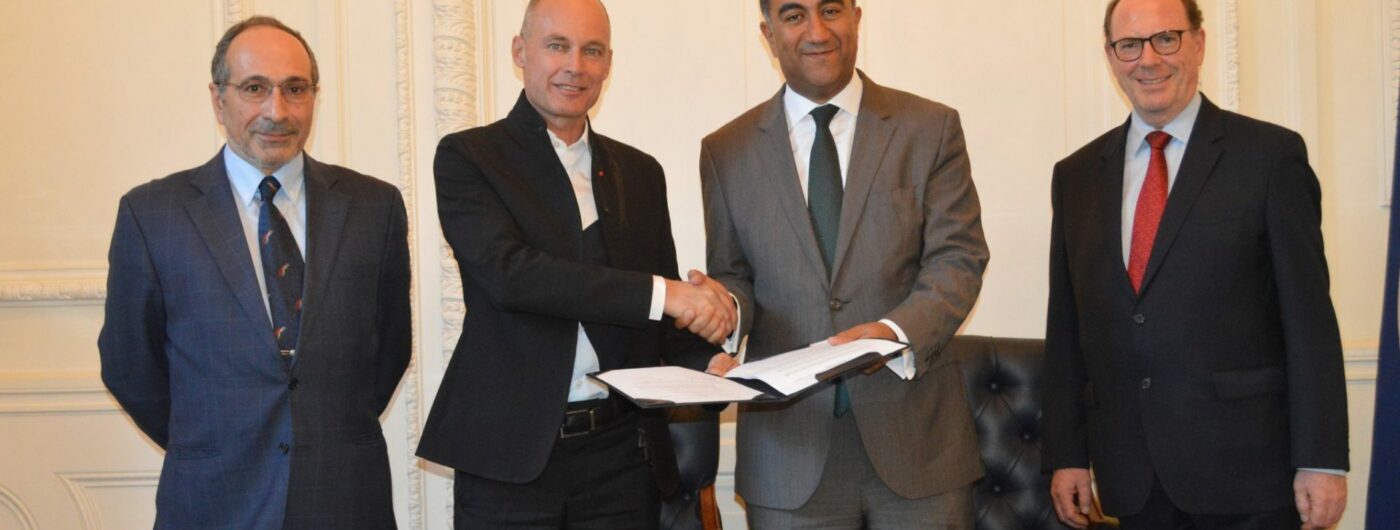
The World Alliance for Efficient Solutions and UfM Secretariat team up to promote sustainable development in the region
Barcelona, 24 May 2017. Bertrand Piccard, Chairman of the Solar Impulse Foundation, and UfM Secretary General Sijilmassi today signed a Memorandum of Understanding between their organizations.
The World Alliance for Efficient Solutions (WAES), established by the Solar Impulse Foundation (SIF), aims to advance the cause of clean technologies and offer tangible solutions to the challenges facing society in its efforts to reach the objectives of the Climate Action Agenda, as defined at the COP21 in Paris.
The cooperation between the UfM and the Alliance will enrich the policy dialogue on energy and climate change in the Euro-Mediterranean region. In particular, it will contribute to the three UfM Energy Platforms especially that dedicated to Renewable Energy and Energy Efficiency (UfM REEE), which aims to promote the deployment of renewable energies and energy efficiency measures to access secure, affordable and reliable energy services and support climate change adaptation and mitigation across the region.
This cooperation will also be an opportunity to mobilise the private sector, in particular companies providing innovative solutions for the energy transition, in support of an ambitious agenda for sustainable development in the Euro-Mediterranean region. Members of the Alliance will be invited to take part in the UfM Energy Business Forum, expected to be held in October 2017 in Egypt.
“We know that people, companies, national and local authorities in the Mediterranean have plenty of solutions to offer for a new, cleaner economy. We want to help promote them, by developing connections between those looking for solutions and those offering them,” said Bertrand Piccard. “We at the Alliance are looking to bring 1,000 efficient and profitable solutions for the environment to COP 24 at the end of 2018, to set the world on a path toward sustainability. I believe the Mediterranean region has a great many ideas that can help others across the world work toward this shared objective,” he added.
Carbon dioxide (CO2) emissions in the Mediterranean have increased by a factor of four in the last half century. The region has been identified as one of the main climate change hotspots due to water scarcity, concentration of economic activities in coastal areas, and reliance on climate-sensitive agriculture. Further, the average temperature in the region has already risen by 1.5°C compared to pre-industrial levels, the limit set by the Paris Agreement.
“Climate action is a great opportunity to achieve sustainable and inclusive development models in the Mediterranean. It is essential to seize this opportunity to leverage investment, foster technology transfer, create job opportunities for our youth, promote the role of women and develop low carbon production and consumption patterns that contribute to greater integration, sustainable development and stability in our region”, said UfM Secretary General Sijilmassi.
The UfM Secretariat works to foster an active participation of the civil society, local and regional authorities, the private sector, financing institutions as well as other key stakeholders in the regional cooperation process for sustainable development and regional integration. The willingness to put the Euro-Mediterranean region at the forefront of the global sustainable development was also reaffirmed by UfM Ministers at the UfM Ministerial Meeting on Energy, held in Rome in December 2016.
More information
- UfM projects on environment and climate action
- UfM Energy Platforms:
- The UfM Regional Electricity Market Platform (UfM REM Platform)
- The UfM Regional Electricity Market Platform (UfM REM Platform)
- The UfM Gas Platform (UfM Gas Platform)

